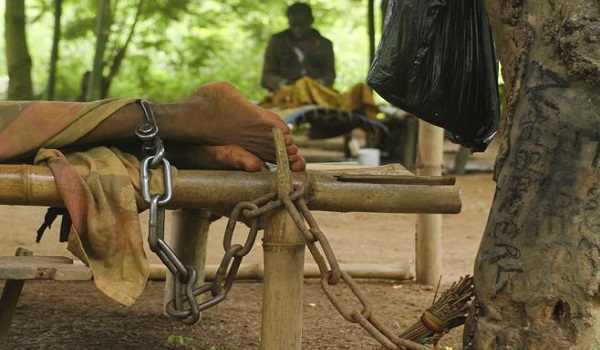 File photo; A man chained at a prayer camp.
File photo; A man chained at a prayer camp.
Watching a documentary on Voice of America about mental health in Ghana did not only make me cringe, I also felt very flustered and for the first time, I was not proud of my greatly loved country. This article aims to hopefully bring a renewed attention to stakeholders responsible for developing mental health services in Ghana, the neglect, maltreatment and human rights abuse our mentally ill citizens continue to endure in 21st century Ghana.
This documentary commences with a man chained to a huge tree at a prayer camp. He is lucid at time of recording and reports that he has been at the prayer camp for over five years, probably chained to this tree the whole time. Family left him at the healing centre five years ago and has not visited him since. This man spoke quite well and his English was fairly good. He had a tiny little cloth wrapped around his waist and this was his life 24/7.
The mistreatment of the mentally ill at prayer camps is well documented in empirical research but, who is responsible for regulating activities at these prayer camps? Are people there to receive healing for their mental illness through prayers, neglect or abuse?
Chaining, withholding food in the name of fasting and beating of the mentally ill has been, or appears to be, a common place in our healing and prayer centres , family homes and even in our psychiatric hospitals. Our responses to mental illness seem to be embedded within spiritual and moral perspectives such that such horrific treatment provokes very little attention or sanction.
Families of our mentally ill citizens struggle to provide care with little or no support from formal mental health services, leaving them with no other alternatives than to leave once loved ones with prophets and faith healers who usually have very little or no experience with mental health treatment or care. For some reason, despite the maltreatment, human right abuses and lack of it effectiveness for healing, prayer camps and healing centres remain quite popular for our citizens. They have no choice. We have failed and continue to fail our mentally ill citizens.
There have been reports by NGOs and the media regarding the widespread maltreatment of the mentally ill in Ghana including graphic images of people in large chains, thin, tattered and very ill. As a country that prides itself as proponents of human rights, it is disappointing that we are allowing such inhumane practices to continue in the 21st century.

It is also striking that there seems to be very little calls for this to stop from our communities. What happened to the principle of human rights’ ‘to prohibit the unlawful deprivation of liberty and the use of cruel, inhumane or degrading treatment or punishment’? Any mental health legislation or policy to stop this? Is the supposed new mental health bill a sign of renewed spur?
According to the World Health Organisation (WHO, 2005) 70% of African countries spend less than 1% of their health budgets on mental health. My view is that social and political apathy towards mental health, combined with widespread stigma impedes the advancement of mental health care in our country. Our psychiatric hospitals suffer from overcrowding, lack of resources, under-funding and under-staffing leading to poor quality care.
Lack of accessible quality care unquestionably contributes to challenges faced by people with mental ill health and their families. People have no choice but to endure suffering, subjected to chaining and other forms of harsh treatment within our prayer camps, healing centres and even in state institutions and we seem to be looking on unperturbed.
Legislation to protect the human rights of people with mental ill health is undoubtedly a vital tool to regulate this inhumane and abusive treatment of our mentally ill citizens. We need to find ways to make it work. It’s time to change.